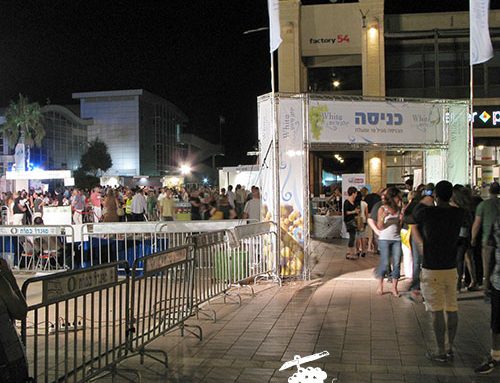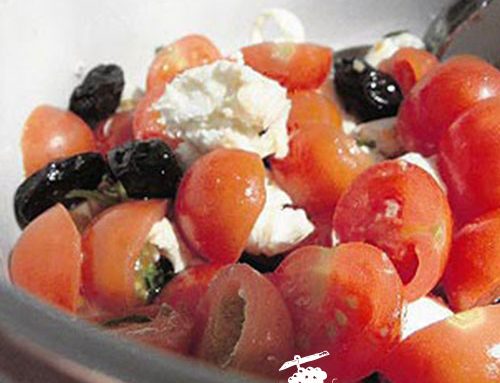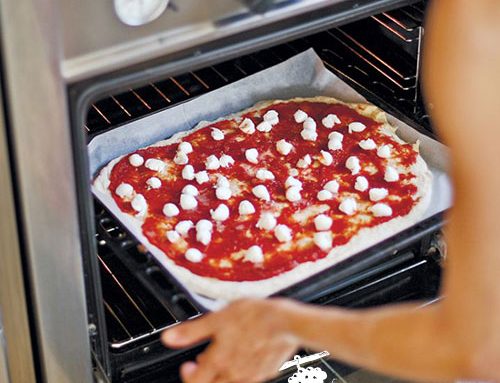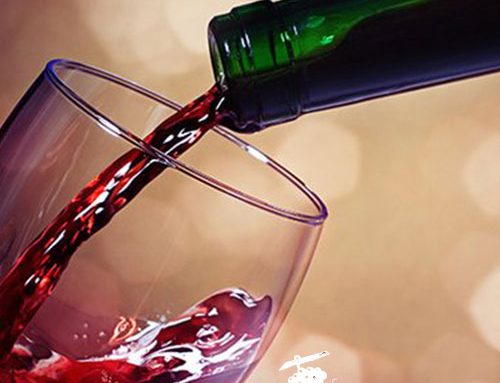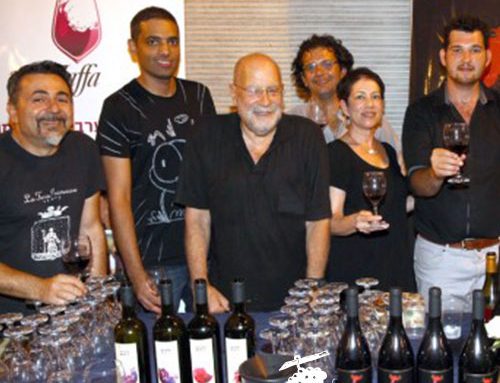A Sicilian Haven Hidden Away in Southern Israel
Elena and Rani Zimbalista have crafted a marvelous vineyard in Moshav Avigdor.
Marina and Elena, mother and daughter, set the table for lunch. On the large stately table they place a plate of squash and carrot carpaccio; a wedge of blue-veined Gorgonzola cheese; slices of bresaola sausage with peeled and quartered purple figs (“Peel a fig for your friend, a peach for your enemy,” Marina recites an old Italian proverb); frozen shot glasses of cantaloupe granite (a dessert of frozen, pureed fruit); and a bowl of cold pasta with smoked tuna, black olives and fresh herbs.
“There’s antipasti and cold dishes because who has the energy to cook or eat hot food in the summer?” Elena explains, although for the bambini − the kids and their friends − they do make a simple and wonderful pizza Margherita dotted with buffalo mozzarella.
Meanwhile, the tablecloth is getting speckled with drops of water coming from the wine bottles that rest in a sea of ice in silver champagne bottle holders. The cold white wine poured into the glasses was made from the fruits of the vineyard visible from the family’s living-room window − a few steps away from the life-size sculptures of women, adorning the garden in the back. Rows of grapevines, their green leaves obscuring the sweet bunches of grapes this time of year, stretch as far as the eye can see, all the way to a line of cypresses off in the distance.
This typical Italian scene did not take place in Venice, the birthplace of the two slender and lovely gray-haired women here, nor in Sicily whose white wines were the inspiration for the family-produced vintage. Elena (Guglielmi) Zimbalista lives here with her husband and children on Moshav Avigdor, between Kiryat Gat and Kiryat Malakhi. Her mother Marina has come, as she does each summer, to visit the family in this Little Italy they’ve made for themselves on the southern coastal plain.
Whirlwind romance
And so the story begins. Elena Guglielmi was born in 1964 to a middle-class family that goes back many generations in Venice. One of her great-grandparents arrived with Napoleon in the 18th century; other family roots are hard to trace. But since then the family has made its home in the city of lagoons on the Adriatic coast. At age 6, Elena began studying classical ballet, and as a teenager she became part of the corps of the Venice Ballet. Life as a professional dancer led her to perform with various renowned companies including those of Verona, Rome and Palermo. After more than a decade of life on the road, she switched to teaching ballet and working in marketing.
One day, not long after she had moved from Rome to Verona, she was invited to dinner at the home of some old friends from the ballet world. “I got to their house and I opened the door,” she recounts. “The man sitting next to Anat − a choreographer and the Israeli wife of a Caribbean-Flemish friend who danced with me in Venice − looked at me and said something to her. He spoke in Hebrew, I didn’t understand what he said, but I saw her react with a dismissive wave of the hand. Anat and Hans introduced me to him and said his name was Rani Zimbalista.”
Zimbalista was born in 1962 in Kiryat Ono, to a German-Jewish family of cigarette manufacturers that had begun immigrating to Palestine in the early 1930s. His grandfather, an engineer, initially worked at building armored vehicles, the burned-out remains of which now stand on the median of the highway to Jerusalem. After the state was founded, he manufactured metal supports for chicken coops, and in the 1960s he began installing hospital beds (“They came to him and told him that the beds left by the British were used up and that he was needed for this national mission. Today we sell hospital beds to 30 different countries”).
Rani’s mother was sculptor Ofra Zimbalista and his brother is well-known percussionist Chen Zimbalista. The hero of our tale − who at a young age took on the running of the family business − is also quite artistically gifted: He is a born storyteller and a gifted drinker, the scion of a glorious drinking tradition. We met Master Zimbalista for the first time almost 20 years ago, at the bar in Tel Aviv’s Schneider Pub, and when other serious drinkers were growing wobbly from imbibing too much, he sat calmly in his seat, making toasts and delivering eloquent speeches.
But let’s get back to the story.
Rani: “I went to Italy on a business trip and called Anat, a childhood friend. She and her husband invited me to dinner at their home and said a friend named Elena might come too. I said that was a pretty name. When she arrived we were in the midst of a conversation. I glanced at her and told Anat to stop talking because my wife just walked into the room. Anat told me to cut the bullshit.”
That dinner took place in Verona on December 21, 1999. That very evening the determined bridegroom-to-be invited the pretty ballerina to a New Year’s Eve-end of the millennium party that was going to be held in Israel 10 days later.
Elena: “I thought: Why not? I’d never been to Israel, he seemed like a nice guy and one might as well get to the end of the world a little drunk. I arrived on December 28 and on December 31 he took me to see the sunrise over the Jerusalem hills, took out a bottle of Dom Perignon and asked me to marry him. I didn’t know what to say. Sure, everything was very nice, but we’d only known each other 10 days. I told him to give me a moment to think. A week later I said yes. When I called to tell Mama she hung up the phone and wouldn’t talk to me for two months. As soon as she met him, everything was great. It was like magic. This guy is more Italian than the Italians.”
Before long the couple married in Cyprus, bought the farm on Moshav Avigdor and decided to plant grapevines.
Rani: “They have a wine tradition that’s hundreds or thousands of years old flowing in their veins, and the Italian blood went into action. She told me in her funny Hebrew-English-Italian that 90 percent of the people drink red wine but that’s not culture. That the Romans called the muscat grape “alexandroni” after the Egyptian city because they brought it from there. That in this kind of heat you drink cold white wine and we’re going to plant white varieties. So [she said] let’s first go to Sicily to see what they grow and drink, in a region that resembles the local area here.” And so they did.
The couple took their two young children − Yahli, who was a year and a half, and baby Dario − rented a camper and set off for Sicilian wine country. When they returned, with soil samples from renowned vineyards there (“We gave them to a lab and compared them to the local soil, which is rich in clay”), and with the aid of local experts, they planted their first vineyard with muscat alexandroni and chardonnay grapes.
Dancing among the vines
Alongside the grapevines, they planted leccino olive trees, just like in Italy where farmers often make their own olive oil for family consumption, as well as fig and other fruit trees. Amid the agricultural plots, they left room for a future sculpture garden with works by Mama Ofra Zimbalista and for a 60-seat amphitheater to host musical performances by brother Chen and other musicians (“My dream is for visitors to wander amid the family vineyards, between the artwork and fruit trees, riding small golf carts stocked with ice buckets and wine bottles, and to enjoy themselves here for a full day at a time,” says Rani).
Remnants of ancient wine presses attest to the extensive industry that once existed in this area of the country. The Italian ballerina moves gracefully among the beloved grapevines and proudly shows off the muscled arms that are the result of daily work in the vineyard.
In the modern era, most of the winemaking glory in Israel is reserved for vineyards situated at high elevations or in special climatic conditions.
“Local wine experts are often disdainful of us because our land is low-lying and the terroir [i.e., the various natural characteristics of a vineyard] hasn’t been studied enough,” Elena explains. “But in the 10 years that we’ve been working the land and the vineyard we’ve discovered that in Avigdor and the surrounding area there is a unique microclimate. There is a sea breeze year-round and even on warm summer nights it’s cool here and there is a range of temperatures.”
In accordance with the writings of Roman agronomists from centuries ago, Elena also waters the grapevines very sparingly, as was done in the past. The Zimbalistas planted their first vines in 2002, had their first grape harvest in 2006 and now have 50 dunams (about 12 acres) of vineyards − but they are planted with only white grapes (not a common choice in the local world of wine): muscat alexandroni, chardonnay, sauvignon blanc and gewurztraminer. The wines are produced at a winery in the Judean Hills, under the direction of a vintner who lends a professional touch to the family’s vision. The results are simple wines that are not necessarily up to the academic standards of serious connoisseurs, but are just right for the local climate and for accompanying the basic ingredients of Mediterranean cuisine.
The Muscato di Zimbalista, made entirely from muscat alexandroni grapes, is not a classic dessert wine, despite the sweetness of the grape and the high alcohol content, but rather a marvelous and refreshing fruity nectar, perfect for enjoying on its own on summer nights. The Sauvinyahli (named after the couple’s oldest son) has aromas of wood and a balance of tart and sweet flavors; the Chardonnay di Zimbalista is surprisingly good, considering the vineyard’s young age. In the future, there will also be a Dariolino di Zimbalista, a blend of gewurztraminer and muscat named for the younger son. Each label features the beautiful blue women made by Mama Zimbalista. As in Italy, everyone plays a part in this family business.


